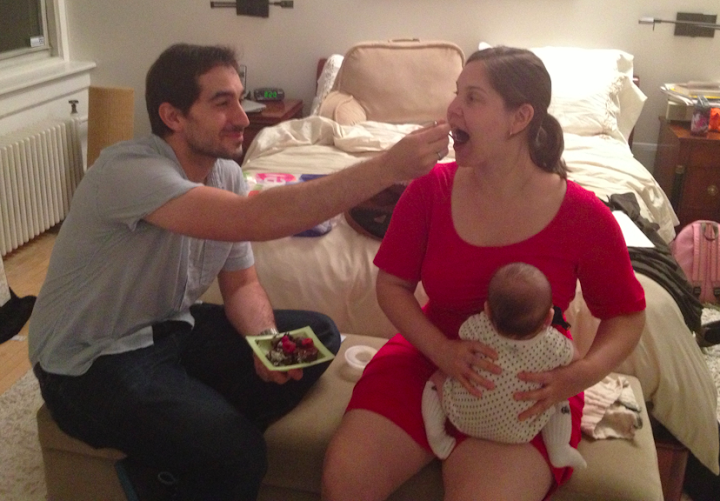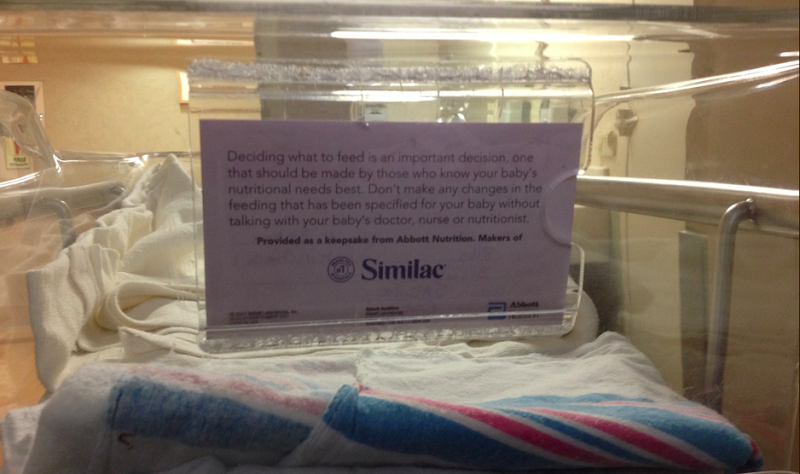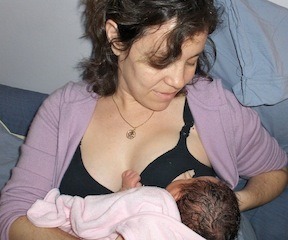There’s been much hype lately about “hyper” parenting styles — from the Time Magazine brouhaha, to that book claiming that French-style mothers do everything better, and Erica Jong’s rant that overly “attached” moms don’t party enough — parenting styles are getting a lot of scrutiny, especially parenting styles that emphasize attentive devotion to an infant’s needs.
I’m always dubious about criticisms of parenting “philosophies” — there’s good and bad in any philosophy, but it doesn’t tell you much about what goes on for real people. I’ve worked with over a thousand mothers; none of them lives a Philosophy.
Here’s the thing — human young are extremely needy — they can’t eat regular food, or walk, or talk, or even hold up their heads, and they take years to mature — any philosophy that ignores that is at best delusional and at worst abusive. On the other hand, real life parents cannot, as a practical matter, terminate every other aspect of life for the care and cultivation of perfect offspring for years and years on end. They need a life, too. Real people make nuanced choices through the day. So big arguments about whether This Style Of Parenting is the be all end all are arguments about nonsense, not practical discussions about what actually works for real moms. I kind of feel like, let’s just throw philosophy in the toilet and talk about real life instead.
But before we do, there are two ways that I see “philosophy” really do some harm, so let’s just get them out of the way, OK?
1. Seeds of Doubt:
If I told you that my eleven year old came up to me asking for a drink of water on a hot day, was panting and red-faced from being outside in the heat and said he was thirsty, and I told him, “It’s not time for your water,” and made him wait 45 minutes, you’d think I was insane for withholding it. Would it matter to you that I’d just read a book telling me to space my child’s drinks evenly through the day and not be tricked by manipulative nagging? What if I told you that my five year old daughter was awake at 5 am crying that she had a bad dream, but I didn’t go in and tickle her back because she hadn’t been in her room twelve hours yet and my book told me that I should be consistent about boundaries and leave her till seven a.m.?
I really hope it would sound like nonsense to you to follow a book at those moments instead of attending to my actual children.
On the other hand, I’m sure we can all imagine other types of situations where I’d be right to say no to both kids — over a lot of protest — where it was clear that they were pushing a boundary and needed some limit setting.
In both cases, I’d be meeting my kids’ needs — the need for unexpected water or back tickling on the one hand, or the need for a boundary on the other.
What’s hard about having a baby, especially your first, is that it’s not always easy to be confident that you can tell what your kid really needs. Here’s where the bevy of books and experts enter, designed to tell you. But the thing is, none of the books live with your kid, and while some of them can be helpful in general about what you may be observing, ultimately the best judge of what your kids are doing and why, is you. But there’s a difference between giving you a general sense of what you may be observing, vs. scaring you out of your own judgment or telling you what to do regardless of the specifics.
What’s really hard in the hour-by-hour of parenting is that no mother always knows the right thing to do. Parenting requires living with some anxiety about how to proceed. The wisest support people you encounter will give you some information about infant development but also help you learn to cope with that anxious feeling of uncertainty. When you have some tools to cope with uncertainty, you can tune in to your best instincts and come up with a good plan for your family. It won’t be perfect every time, but nothing is; it will be good enough.
The dogmatic books and experts, on the other hand, tell you it’s all very simple — three steps or five minutes or twelve nights, but if your life doesn’t happen to fit perfectly with their regimen, that lack of nuance sadly works to increase your self-doubt the way that airbrushed and photoshopped images of women plant seeds of self-doubt even in the most body-confident woman.
With the photo-shopped images, the best course is to minimize your exposure so they can’t infect your brain. Increasingly, I’m thinking, lets do the same with experts and books that leave no room for the real, weird, nuanced complexity of you and your baby. Find the people who help you learn to cope with uncertainty. Real moms, in real life, are the best place to start.
2. Some Philosophies Are Just Wrong.
OK some basics: Human infants need to be held. They need to be fed very frequently. They need an adult around who can make eye contact, and engage. There is simply no way around these facts. Any book that is essentially telling you that you can turn your human infant into a tadpole who does not need parenting, is wrong. Any book that says that you can harm your children by loving them or by attending to their needs, is wrong. Any book that says that you should not ever trust your instincts about what your child needs, is wrong.
Having said all that, we’d be missing half the problem if I ended it there. Because the flip side is: Human mothers have feelings about meeting the needs of their infants — good feelings and bad feelings. It is not always easy, it is not always fun, it is not always lovable to be appropriately available to the needs of a growing child. It can be frustrating and annoying and very lonely. And any book that says that your own feelings and needs are irrelevant, that you shouldn’t have them or that you should ignore them, or that good mothers never feel these things — is equally wrong. And any book that tells you that you should not want anything beyond meeting the immediate needs of your infant, is wrong and misogynist. What you feel, and what you want are not always aligned with what you are prepared to do.
So — on the one hand, infants are genuinely needy and it is appropriate to meet their needs. On the other hand, as a mother you may not always love that. How do we reconcile these things?
I think the way to answer that is to look at what not to do. It’s a mistake and so unfair to reconcile these by not meeting your baby’s needs or by deluding yourself that your baby doesn’t have them. Your baby is just a baby; she needs parenting.
On the other hand, you don’t want to go to the other extreme either. I like this piece by Katherine Stone which reviews a study in the Journal of Child and Family Studies which found that an “Intense” parenting style made parents unhappy and even clinically depressed. “Intense” parenting style puts the needs of the infant at such a premium that the parents become irrelevant, and it’s no better than the other extreme. Katherine discusses how this is different from developmentally appropriate parenting, where parents attend to the children without ignoring themselves.
I have to tell you, I read the list of “Intense Parenting Tenets” and felt like clawing my eyes out — yeah, you’d become depressed if you believed these things. Below are the “Tenets” and, following, my revision, for you to modify to your own life and your own needs, day by day:
INTENSE PARENTING: • mothers, not fathers, are the most necessary and capable parent
REVISION:
1. Mothers are really important to their babies, and women who’ve just become mothers sometimes underestimate how much they’re capable of and how necessary they are in their babies’ lives. That doesn’t mean you’re the only one who can or should attend to your baby’s needs. It also doesn’t mean that you are going to love every second of it.
(also, p.s., how heteronormative?!)
INTENSE PARENTING: • parents’ happiness is derived primarily from their children
REVISION:
2. Parents of older children often describe their children as a source of happiness and enrichment — this is something new parents can look forward to. Parents of newborns are often surprised that they don’t feel a deep relationship yet. Many of them take great pleasure and satisfaction in many aspects of being with their babies, but many of them also feel a sense of mourning for the kind of freedom and happiness that went with being childless. It is an adjustment. As an ongoing matter, adults need adults in their lives for happiness and stimulation, not just children and babies. However, the bond you share with your children can be extremely rewarding, especially as it deepens over time.
INTENSE PARENTING: • parents should always provide their children with stimulating activities that aid in their development
REVISION:
3. Living with an attentive adult who makes eye contact, holds the baby and talks, and reads to her, is phenomenally stimulating for an infant. Think of your job as a parent as to introduce your child to the world, not to create a second-by-second bonanza of stimulation. Hanging out is often the perfect activity. When you’re about to do something, you can start by thinking, “does this seem like it would be fun?” Yes, for you, not just for your baby.
INTENSE PARENTING: • parenting is more difficult than working
REVISION:
4. Parenting is surprisingly difficult if you imagined it was going to be easy. It is harder than some jobs and easier than others. The pay is awful but there is a casual dress code.
INTENSE PARENTING: • a parent should always sacrifice their needs for the needs of the child
REVISION:
5. A parent should sometimes sacrifice her needs for the needs of the child, and sometimes the child is going to have to sacrifice or wait on the needs of the parent. This is true in any relationship and also true in parenting. The difference is that in other relationships, both parties decide together about give and take. With your child, you are responsible for figuring out what fair sacrifices on both sides are, because you are the adult. If you have loving friends in your life and you aren’t depressed, you will learn to have confidence that you can make good judgments about how to balance that, but you will not always be certain that you’ve done it right. That is okay, and enough.
This is a saner version of parenting, but it needs some honing to your particular situation, and that takes time. I hope you contact me so we can talk about it further.





